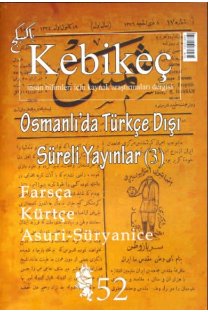Sömürgecilik sonrası dönem eserlerinin Türkçeye çevrilmesinde tercih edilebilecek yöntemler things fall apart adlı eserin Türkçe çevirilerinin karşılaştırmalı analizi
Translation strategies used in the translation of postcolonial literary texts into Turkish: Turkish translations of things fall apart
___
Achebe, Chinua (1958), Things Fall Apart. Oxford: Heinemann Educational Publishers.Achebe, Chinua (1983), Ruhum Yeniden Doğacak. Anjel Selveroğlu (çev.) İstanbul: Üç Çiçek Yayınevi.
Achebe, Chinua (1961/1988), An Image of Africa: Racism in Conrads Heart of Darkness. Heart of Darkness, An Authoritative Text, Background and Sources Criticism. Robert Kimbrough (Yay. Haz.) London: W. W Norton and Co., ss. 251-261.
Achebe, Chinua (1994), The African Writer and the English Language. Colonial Discourse and Post-Colonial Theory: A Reader. Patrick Williams and Laura Chrisman (Yay.Haz.), New York: Colombia UP.
Achebe, Chinua (2001), Colonialist Criticism. The Post-Colonial Studies Reader. Bill Aschcroft and Gareth Griffiths, Helen Tiffin (Yay. Haz.), London; New York: Routledge.
Achebe, Chinua (2011), Parçalanma. Nazan Arıbaş Erbil (çev.) İstanbul: İthaki.
Barry, Peter (1995/2002), Beginning Theory: An Introduction to Literary and Cultural Theory. Manchester; New York: Manchester UP.
Bassnett, Susan ve Harish Trivedi (1999), Introduction: Of Colonies, Cannibals and Vernaculars. Post-Colonial Translation: Theory and Practice. Susan Bassnett ve Harish Trivedi (Yay. Haz.). London; New York: Routledge, ss. 1-18.
Bhabha, Homi K. (1994), The Location of Culture. London; New York: Routledge.
Jakobson, Roman (2000), On Linguistic Aspects of Translation. The Translation Studies Reader. Lawrence Venuti (Yay. Haz.), London; New York: Routledge, ss. 113-118
Index Translationum. UNESCO Statistics. Top 50 Original Language. 31.10.2014. http://www.unesco.org/xtrans/bsstatexp.aspx?crit1L=3&nTyp=min&topN=50
Manfredi, Marina (2010), Preserving Linguistic and Cultural Diversity in and through Translation: From Theory to Practice. Mutatis Mutandis. Cilt 3, No. 1. ss. 45-72.
Munday, Jeremy (2001/2008), Introducing Translation Studies: Theories and Applications. London; New York: Routledge.
Niranjana, Tejaswini (1992), Siting Translation: History, Post-Structuralism, and the Colonial Context. Berkeley; Los Angeles; Oxford: University of California Press.
Robinson, Douglas (1997/2011), Translation and Empire: Postcolonial Theories Explained. London; New York: Routledge.
Rushdie, Salman (1991), Imaginary Homelands: Essays and Criticism 1981-91. London: Granta Books.
Simon, Sherry (2000), Introduction. Changing the Terms: Translating in the Postcolonial Era.
Sherry Simon and Paul St-Pierre (Yay.Haz.), Ottawa: University of Ottawa Press, ss. 9-33.
Spivak, Gayatri Chakravorty (2000), The Politics of Translation. Translation Studies Reader. L. Venuti (Yay.Haz.), London; New York: Routledge, ss. 397-416
Tymoczko, Maria (2000), Translations of Themselves: The Contours of Postcolonial Fiction. Changing the Terms: Translating in the Postcolonial Era. Sherry Simon ve Paul St-Pierre (Yay.Haz.), Ottawa: University of Ottawa Press, ss. 147-167.
Tymoczko, Maria (ed.) (2010), Translation, Resistance, Activism. Amherst; Boston: University of Massachusetts Press.
Usta, Bülent (2011), Babalar ve Oğulları. Milliyet Kiap (Mayıs 2011) s. 26.
Venuti, Lawrence (1995), The Translators Invisibility: A History of Translation. London:Routledge.
- ISSN: 1300-2864
- Yayın Aralığı: 2
- Başlangıç: 1995
- Yayıncı: Mehtap Yüksel
Türkiye'de kimyasal hadımın olağanüstü hali ve moleküler biyopolitika
Cizre kırmızı medrese: Mimari, iktidar ve tarih
Görülmüştür damgalı mektuplar
Merak ve dedikoduda dişilleşmek erkekliğin bir ortaklığı mıdır? evde filminde erkeklik üzerine
Tehcir ve ermeni nüfusu tartışmasına bir katkı: Kayseri sancağı
Cemre ARI, Merve ASLANER, Ilgın BALKAN, Gizem BAŞPINAR, Şeyma BAYRAK
